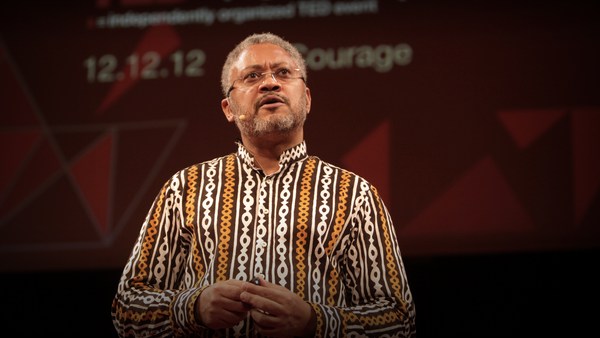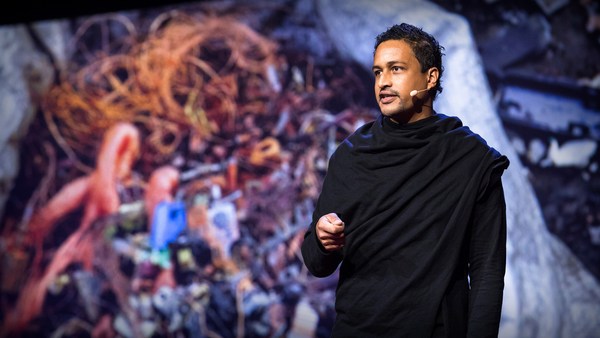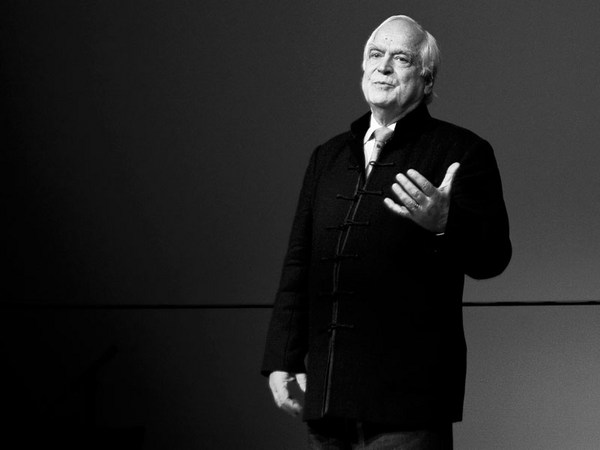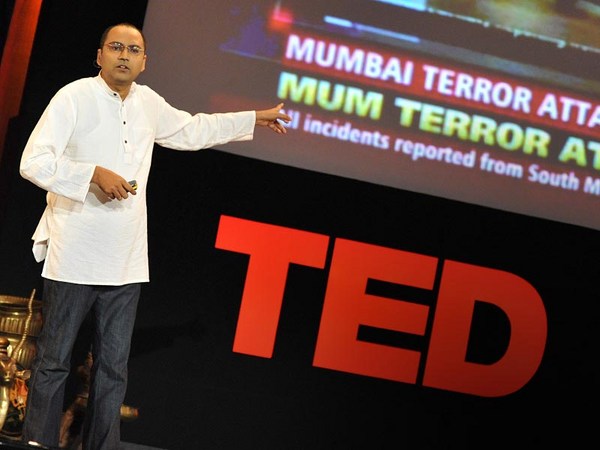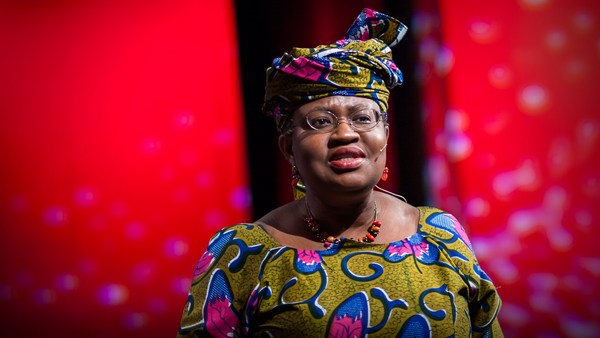So in 2011, someone broke into my sister's office at the university where she teaches in Nigeria. Now thankfully, the person was caught, arrested and charged to court. When I get into court, the clerks who were assigned to my sister's case informed her that they wouldn't be able to process the paperwork unless she paid a bribe. Now, at first she thought it was part of a practical joke. But then she realized they were serious. And then she became furious. I mean, think about it: here she was, the recent victim of a crime, with the very people who were supposed to help her, and they were demanding a bribe from her. That's just one of the many ways that corruption impacts millions of people in my country.
You know, growing up in Nigeria, corruption permeated virtually every element of the society. Reports of politicians embezzling millions of dollars were common. Police officers stealing money or extorting money from everyday hardworking citizens was routine practice. I felt that development could never actually happen, so long as corruption persisted. But over the past several years, in my research on innovation and prosperity, I've learned that corruption is actually not the problem hindering our development. In fact, conventional thinking on corruption and its relationship to development is not only wrong, but it's holding many poor countries backwards.
So, the thinking goes like this: in a society that's poor and corrupt, our best shot at reducing corruption is to create good laws, enforce them well, and this will make way for development and innovation to flourish. Now, it makes sense on paper, which is why many governments and development organizations invest billions of dollars annually on institutional reform and anti-corruption programs. But many of these programs fail to reduce corruption, because we have the equation backwards. You see, societies don't develop because they've reduced corruption. They're able to reduce corruption because they've developed. And societies develop through investments in innovation.
Now, at first, I thought this was impossible. Why would anyone in their right mind invest in a society where, at least on the surface, it seems a terrible place to do business? You know, a society where politicians are corrupt and consumers are poor? But then, the more I learned about the relationship between innovation and corruption, the more I started to see things differently.
Here's how this played out in sub-Saharan Africa as the region developed its telecommunications industry. In the late 1990s, fewer than five percent of people in sub-Saharan Africa had phones. In Nigeria, for example, the country had more than 110 million people but fewer than half a million phones in the whole nation. Now, this scarcity fueled widespread corruption in the industry. I mean, public officials who worked for the state-owned phone companies demanded bribes from people who wanted phones. And because most people couldn't afford to pay the bribes, phones were only available to those who were wealthy.
Then an entrepreneur named Mo Ibrahim decided that he would set up a telecommunications company on the continent. Now, when he told his colleagues about his idea, they just laughed at him. But Mo Ibrahim was undeterred. And so in 1998, he set up Celtel. The company provided affordable mobile phones and cell service to millions of Africans, in some of the poorest and most corrupt countries in the region -- I mean countries such as Congo, Malawi, Sierra Leone and Uganda. You see, in our research, we call what Mo Ibrahim built a "market-creating innovation." Market-creating innovations transform complicated and expensive products into products that are simple and affordable, so that many more people in society could access them. Now in this case, phones were expensive before Celtel made them much more affordable.
As other investors -- some of his colleagues, actually -- saw that it was possible to create a successful mobile phone company on the continent, they flooded in with billions of dollars of investments. And this led to significant growth in the industry. From barely nothing in 2000, today, virtually every African country now has a vibrant mobile telecommunications industry. The sector now supports close to one billion phone connections, it has created nearly four million jobs and generates billions of dollars in taxes every year. These are taxes that governments can now reinvest into the economy to build their institutions. And here's the thing: because most people no longer have to bribe public officials just to get a phone, corruption -- at least within this industry -- has reduced. Now, if Mo Ibrahim had waited for corruption to be fixed in all of sub-Saharan Africa before he invested, he would still be waiting today.
You know, most people who engage in corruption know they shouldn't. I mean, the public officials who were demanding bribes from people to get phones and the people who were paying the bribes -- they knew they were breaking the law. But they did it anyways. The question is: Why? The answer? Scarcity.
See, whenever people would benefit from gaining access to something that scarce, this makes corruption attractive. You know, in poor countries, we complain a lot about corrupt politicians who embezzle state funds. But in many of those countries, economic opportunity is scarce, and so corruption becomes an attractive way to gain wealth. We also complain about civil servants like police officers, who extort money from everyday hardworking citizens. But most civil servants are grossly underpaid and are leading desperate lives. And so for them, extortion or corruption is a good way to make a living.
You know, this phenomenon also plays itself out in wealthy countries as well. When rich parents bribe university officials --
(Laughter)
When rich parents bribe university officials so their children can gain admission into elite colleges, the circumstance is different, but the principle is the same. I mean, admission into elite colleges is scarce, and so bribery becomes attractive.
The thing is, I'm not trying to say there shouldn't be things that are scarce in society or things that are selective. What I'm just trying to explain is this relationship between corruption and scarcity. And in most poor countries, way too many basic things are scarce. I mean things like food, education, health care, economic opportunity, jobs. This creates the perfect breeding ground for corruption to thrive. Now, in no way does this excuse corrupt behavior. It just helps us understand it a bit better. Investing in businesses that make things affordable and accessible to so many more people attacks this scarcity and creates the revenues for governments to reinvest in their economies.
Now, when this happens on a countrywide level, it can revolutionize nations. Consider the impact in South Korea. Now, in the 1950s, South Korea was a desperately poor country, and it was very corrupt. The country was ruled by an authoritarian government and engaged in bribery and embezzlement. In fact, economists at the time said South Korea was trapped in poverty, and they referred to it as "an economic basket case." When you looked at South Korea's institutions, even as late as the 1980s, they were on par with some of the poorest and most corrupt African countries at the time. But as companies like Samsung, Kia, Hyundai invested in innovations that made things much more affordable for so many more people, South Korea ultimately became prosperous.
As the country grew prosperous, it was able to transition from an authoritarian government to a democratic government and has been able to reinvest in building its institutions. And this has paid off tremendously. For instance, in 2018, South Korea's president was sentenced to 25 years in prison on corruption-related charges. This could never have happened decades ago when the country was poor and ruled by an authoritarian government. In fact, as we looked at most prosperous countries today, what we found was, they were able to reduce corruption as they became prosperous -- not before.
And so where does that leave us? I know it may sound like I'm saying we should just ignore corruption. That's not what I'm saying at all. What I'm suggesting, though, is that corruption, especially for most people in poor countries, is a work-around. It's a utility in a place where there are fewer better options to solve a problem. Investing in innovations that make products much more affordable for many people not only attacks this scarcity but it creates a sustainable source of revenue for governments to reinvest into the economies to strengthen their institutions. This is the critical missing piece in the economic development puzzle that will ultimately help us reduce corruption.
You know, I lost hope in Nigeria when I was 16. And in some ways, the country has actually gotten worse. In addition to widespread poverty and endemic corruption, Nigeria now actually deals with terrorist organizations like Boko Haram. But somehow, I am more hopeful about Nigeria today than I have ever been before. When I see organizations investing in innovations that are creating jobs for people and making things affordable -- I mean organizations like Lifestores Pharmacy, making drugs and pharmaceuticals more affordable for people; or Metro Africa Xpress, tackling the scarcity of distribution and logistics for many small businesses; or Andela, creating economic opportunity for software developers -- I am optimistic about the future. I hope you will be, too.
Thank you.
(Applause)
